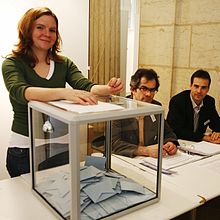
Back الانتخابات في فرنسا Arabic Volby ve Francii Czech Εκλογές στη Γαλλία Greek انتخابات در فرانسه Persian Viidennen tasavallan vaalit Finnish Élections en France French フランスの選挙 Japanese 프랑스의 선거 Korean Verkiezingen in Frankrijk Dutch Eleições na França Portuguese

| This article is part of a series on |
 |
|---|
|
|
France is a unitary semi-presidential republic with a bicameral legislature. Public officials in the legislative and executive branches are either elected by the citizens (directly or indirectly) or appointed by elected officials. Referenda may also be called to consult the French citizenry directly on a particular question, especially one which concerns amendment to the Constitution.
France elects on its national level a head of state – the president – and a legislature.
- The president is elected for a five-year term (previously, seven years), directly by the citizens.
- The Parliament (Parlement) has two chambers.
- The National Assembly (Assemblée Nationale) has 577 members, elected for a five-year term in single seat-constituencies directly by the citizens.
- The Senate (Sénat) has 348 members, elected for six-year terms. 328 members are elected by an electoral college consisting of elected representatives from each of 96 departments in metropolitan France, 8 of which are elected from other dependencies, and 12 of which are elected by the French Assembly of French Citizens Abroad (Assemblée des Français de l'étranger) which has replaced the High Council of French Citizens Abroad (Conseil Supérieur des Français de l'Étranger) a 155-member assembly elected by citizens living abroad.
In addition, French citizens elect a variety of local governments. There also are public elections for some non-political positions, such as those for the judges of courts administering labour law (conseils de prud'hommes), elected by workers and employers, or those for judges administering cases of rural land leases. This article covers only political elections.
French politics has ordinarily displayed some tendencies characterizing a two-party system in which power alternates between relatively stable coalitions, each being led by a major party: on the left, the Socialist Party, on the right, Les Républicains and its predecessors. This pattern was upset in 2017, when neither of those parties' candidates reached the second round of the presidential election and the newly formed party En Marche! gained both the presidency and a comfortable majority in the National Assembly.
Elections are conducted according to rules set down in the Constitution of France, organic laws (lois organiques), and the electoral code. Voting is not compulsory.
Elections are held on Sundays.[1] The campaigns end at midnight the Friday before the election;[2] then, on election Sunday, by law, no polls can be published,[3] and no electoral publications or broadcasts can be made.[4] The voting stations open at 8 am and close at 6 pm in small towns or at 8 pm in cities, depending on prefectoral decisions. By law, publication of results or estimates is prohibited prior to that time; estimates are however often available from foreign media and Internet sites, e.g. those located in Belgium and Switzerland, before the official publication in France. The specified times are in the time zone of the district, which is uniform (Paris time) across Metropolitan France, but varies in French overseas territories such as French Guiana, Martinique and Guadeloupe.
The first official estimate of the results can consequently become available from Sunday, 8 pm, Paris time. Due to their different time zones, voters in some overseas territories previously knew the probable results of elections before the polling booths in Metropolitan France had closed, which could have discouraged voter participation in these places. For this reason, since the 2000s,[when?] elections in French overseas territories in the Americas, as well as embassies and consulates there, are held on Saturdays as a special exemption.
The most recent national elections took place on June 30 and July 7, 2024.
- ^ "Electoral code, article L55" (in French). Legifrance.gouv.fr. 27 October 1964. Retrieved 6 May 2012.
- ^ "Electoral code, article R26" (in French). Legifrance.gouv.fr. 27 October 1964. Retrieved 6 May 2012.
- ^ Law 77-808 of 19 July 1977 relative to publication and broadcasting of certain opinion polls, article 11
- ^ "Electoral code, article L49" (in French). Legifrance.gouv.fr. Retrieved 6 May 2012.